Nearly forty years ago, I decided to devote my career to confronting the core problem facing nonhuman animals and their advocates: nonhuman animals’ rightlessness.
In those early days, my work was mostly done at my kitchen table, surrounded by dozens, then hundreds of books and papers–every written source I could find on the origins of legal rights, the long history of struggles for those rights, and the science that helps us humans understand who other animals are (for we humans are, of course, also animals).
In the following years, building on what I had gained from this extensive research and my experience as a lawyer, I began to add my own law review articles and books on why nonhuman animals are entitled to legal rights as a matter of justice and scientific fact. I started teaching Animal Rights Law in eventually nine law schools, including Harvard and Stanford. I had concluded that the work ahead needed to be laser-focused on persuading judges to transform at least some nonhuman animals from legal “things” with no rights to “persons” with fundamental rights, just as courts had transformed oppressed humans from things to persons following centuries of struggle in and beyond courtrooms.
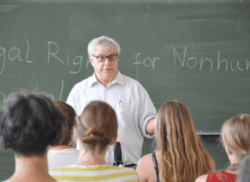
In 1995, ready to move forward with this mission, I founded the Nonhuman Rights Project (NhRP)–which was then, and is now, the only civil rights organization dedicated solely to securing legal rights for nonhuman animals.
Soon, other lawyers joined me at the table. Then law students eager for change. Then scientists, including Dr. Jane Goodall, who studied nonhuman animals around the world and would begin to help us lawyers and eventually judges understand their findings. Then animal advocates who had witnessed firsthand the appalling limitations of animal welfare, which they saw play out time and time again in the lives of beings whose only crime was to not be human.
This was only the beginning.
Like me, the people in this ever-growing community, and on our ever-growing NhRP team, were deeply troubled by nonhuman animals’ thinghood and the pervasive suffering and injustice it perpetuated. We came together to work to change their archaic, unjust legal status and build a world where nonhuman animal rights are protected alongside human rights–a future where nonhuman animals are not trapped in endless torment behind literal and figurative walls which we built and which we can dismantle. Which we must dismantle.
In 2007, after twenty-two years of deep preparation, we began to prepare unique lawsuits: common law habeas corpus cases on behalf of nonhuman animals. We knew the fight in court and the overall struggle would be complex, serious, and long because it involved persuading judges that the question of nonhuman animal rights must depend not on the mere identity of species, i.e. whether or not they’re human, but upon judges’ most cherished values and principles of justice, including liberty and equality, and who nonhuman animals are intrinsically.
This deep preparation took six years, until 2013, when we filed our first lawsuits–the world’s first lawsuits demanding recognition of nonhuman animals’ legal personhood and right to liberty. Once secured, this right would be enforceable–not just symbolic. It would be lasting–not able to be overturned with the changing of political tides. It would change the lives of our nonhuman animal clients, bringing them freedom and dignity–not leave them at the mercy of those who benefited from their continued imprisonment.
In the decade since, we have made tremendous progress, faster than I ever could have imagined so many years ago. We have gained the support of experts on nonhuman animal cognition and behavior, animal law, philosophy, religion, and more, as well as people around the world who care about how we view and treat nonhuman animals. We have secured the world’s first habeas corpus hearings on behalf of nonhuman animals in our chimpanzee and elephant rights cases. We have expanded into legislation and grassroots advocacy. We are changing the conversation about what members of other species deserve under the law.
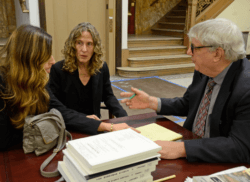
Already this year, Ecuador has recognized nonhuman animals as rightsholders, relying in part on a brief submitted by the NhRP and The Brooks McCormick Jr. Animal Law & Policy Program at Harvard Law School. On May 18, 2022, New York’s highest court will become the highest court of an English-speaking jurisdiction to hear arguments demanding a legal right for a nonhuman animal in our litigation to free Happy from the Bronx Zoo to a sanctuary, which The Atlantic has called “the most important animal-rights case of the 21st century.” Next week, we are filing our first nonhuman rights lawsuit in California, with cases and campaigns soon to follow in multiple jurisdictions in California, in Colorado, in India, and in Israel, and even more which we will share as soon as we can.
We have achieved what we have, and grown as we have, in large part because every seat at the NhRP table has been filled by talented people–lawyers, communications professionals, development professionals, legislative and grassroots campaigns professionals, and nonprofit operations professionals–who I learn from and am honored to work with every day (and many days, into the night!). Many NhRP staff members you have met at our hearings and rallies, interacted with on our Zoom webinars, or seen in news stories about our work. Some are more comfortable behind the scenes so you might see their faces only seldomly. They are all pivotal to the legal milestones we have reached in the global struggle for nonhuman rights.
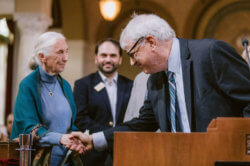
Up to this point in our organizational history, I have argued all our cases, i.e. physically appeared before and made our case to the judges, whether we had ten minutes or ten hours. What many might not realize is that this moment–standing before the court, answering the judges’ questions, demonstrating the utter wrongness of what our clients’ captors are saying to try to maintain the status quo–is the culmination of, and only possible because of, those thousands of hours the legal team as a whole spends on preparation, including debating strategy and going line by line through hundreds, sometimes thousands, of pages of court filings to make sure every word is exactly right.
"The idea of animal welfare failed a long time ago." In this week's @NewYorker, our founder @Steven_M_Wise talks to @lawrence_wright about why we're fighting for nonhuman animal rights to be protected alongside human rights in our litigation to #FreeHappy. https://t.co/pRQahCaqSS
— Nonhuman Rights Project (@NonhumanRights) February 28, 2022
In part because of how deeply proud I am of everyone at the NhRP and all we have accomplished together, I am thrilled to announce that we are now expanding the roster of lawyers who will be arguing our cases, which will allow us to file more cases on behalf of more nonhuman animals in more jurisdictions and demonstrate even more powerfully how talented our team is. This will also allow me to devote much more time to what has been a fundamental aspect of our work from the beginning: educating diverse audiences, including the next generation of lawyers, about the urgent need and basis for nonhuman rights and talking to all sorts of folks, all over the world, who want to join us in this fight.
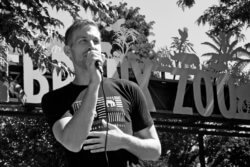
Appearing before the New York Court of Appeals in Happy’s case will be Monica Miller–a highly experienced lawyer who has been with the NhRP since our founding and served as lead counsel in over 30 federal cases, including before the United States Supreme Court. Monica is one of the youngest women to argue before the Supreme Court, and PBS has listed Ruth Bader-Ginsburg’s dissent in a separation-of-church-and-state case Monica argued as one of her five most powerful Supreme Court opinions.
Jake Davis will argue our California case, which we will tell you more about next week, including who our clients are and how you can help. Previously, Jake worked in federal court (under the Honorable S. James Otero of the United States District Court for the Central District of California), for the U.S. government (at the United States Attorney’s Office for the Southern District of California), and in private practice (Squire Patton Boggs).
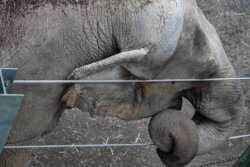
Our entire team of lawyers—in addition to Monica, Jake, and I, they include Elizabeth Stein, Kevin Schneider, and Spencer Lo—will remain fervently at work on our ongoing litigation for as many hours of the day our clients need, each bringing their immense skill and carefully considered insights to the process in the same way that has allowed us to argue these cases at all. At the same time, our Communications team (led by Lauren Choplin), our Development team (led by Mickey Suzuki), our Government Relations and Campaigns team (led by Courtney Fern), and our Operations team (led by Peggy Cusack) will continue to marshal all the resources we possibly can on our clients’ behalf, including keeping tabs on changes in policies and laws that might impact our current and future clients, engaging our supporters and mobilizing them on behalf of our clients when we need help convincing a decision-maker to do the right thing, and raising awareness of our clients’ stories and why we must protect their freedom.
I hope you are as excited as I am about this moment in the global struggle for nonhuman rights. This work will continue to take patience, persistence, compassion, scientific evidence, rational argument, and time: after all, nonhuman animals have been “things” for over 2000 years, and among autonomous beings, Happy is not alone, nor are elephants. Countless other nonhuman animals peer out from within their prisons, not knowing there are humans out there bent not on exploiting them, but on freeing them. As I express my gratitude to my colleagues at the NhRP, I also express it to you, our supporters, who are an important part of this story and fight too. We might be the ones arguing on Happy’s behalf on May 18th, but we know you are right there with us, whether you are in the courtroom that day or watching from afar. Thank you, thank you, thank you.